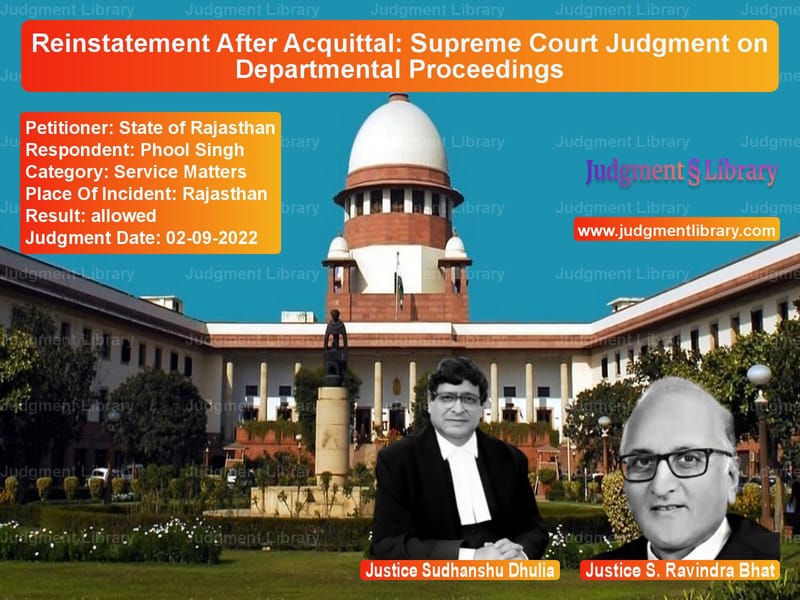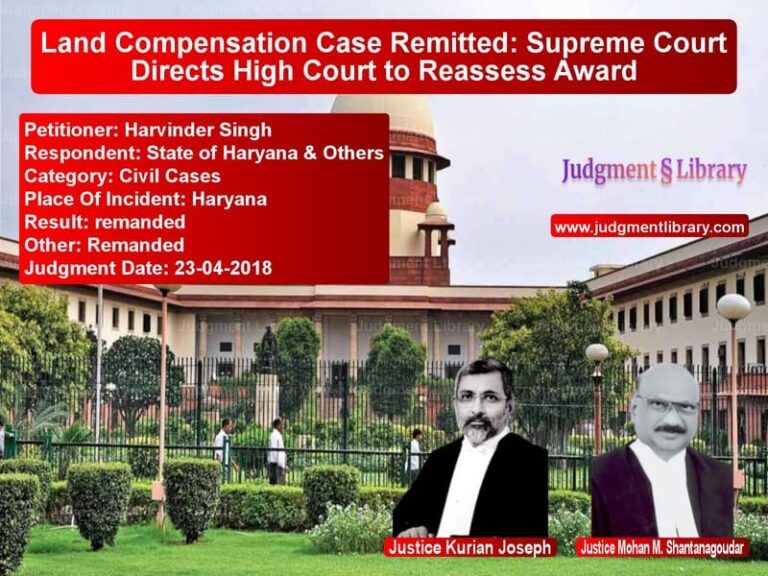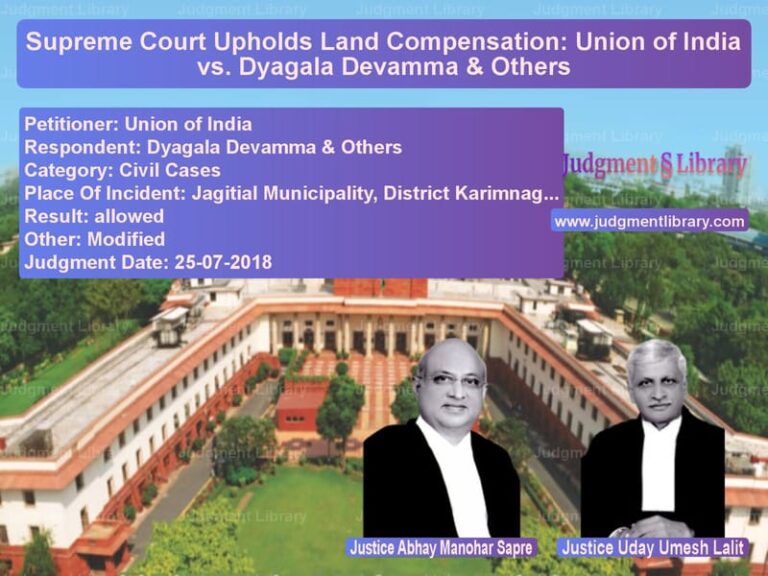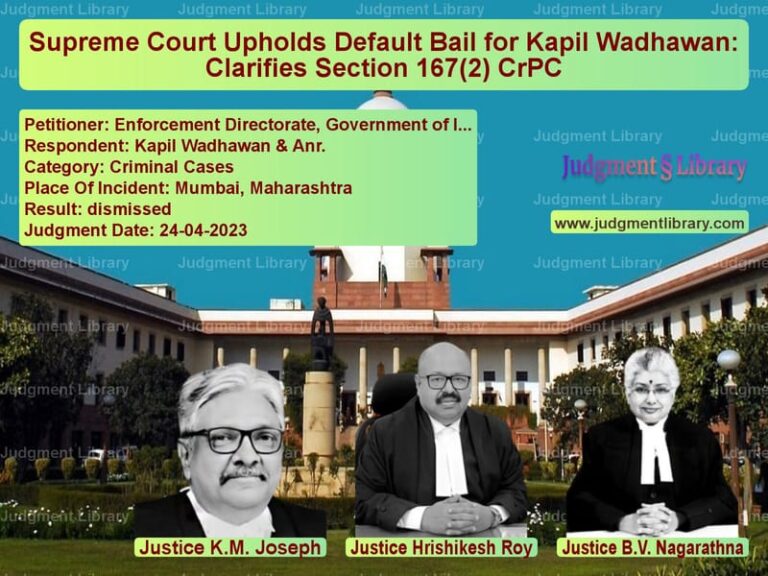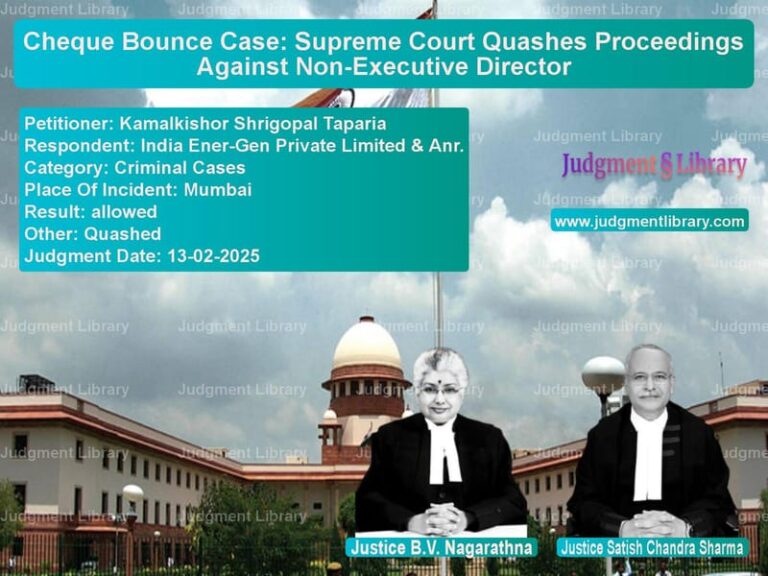Reinstatement After Acquittal: Supreme Court Judgment on Departmental Proceedings
This Supreme Court case examines the issue of whether a dismissed government employee, who had been acquitted in a criminal trial on the same charges, is entitled to reinstatement in service. The respondent, Phool Singh, had been a constable in the Rajasthan Police Service and was dismissed from service following departmental proceedings. These proceedings arose from serious allegations including extortion, drunken behavior, and the discharge of a firearm. While he was convicted in the trial court, his conviction was later overturned by the appellate court based on the benefit of the doubt. Following his acquittal, Phool Singh sought reinstatement, leading to this case.
The central question before the Court was whether the acquittal in a criminal trial automatically warranted reinstatement, even when the dismissal from service was based on departmental proceedings that were governed by different standards of proof. The Court’s decision in this case clarifies the legal distinction between criminal proceedings and departmental inquiries, particularly when the two proceedings are based on the same set of facts.
Background of the Dispute
Phool Singh was recruited to the Rajasthan Police Service in 1987. In October of the same year, while off-duty, he was involved in an incident where he allegedly extorted money from a man, Mahesh Kumar, and attempted to steal his motorcycle. The situation escalated, and Phool Singh allegedly fired a gun at the crowd chasing him, injuring his family members in the process. An FIR was filed, and after an investigation, charges were framed against him for extortion, attempted murder, and violation of the Arms Act.
Phool Singh was convicted in 1994 by the trial court under Sections 392 (extortion) and 3/25 of the Arms Act, and sentenced to one year of rigorous imprisonment. However, the appellate court later acquitted him, giving him the benefit of the doubt. Meanwhile, departmental proceedings were initiated against him for misconduct and gross indiscipline based on the same set of facts. He was found guilty in these proceedings and dismissed from service in 1989. His dismissal was upheld by both the appellate authority and the reviewing authority.
After his acquittal in the criminal trial, Phool Singh sought reinstatement, arguing that the dismissal based on the same charges should be reconsidered. He filed a writ petition, which was initially dismissed by the Single Judge of the Rajasthan High Court. However, the Division Bench of the High Court later allowed his petition, directing that he be reinstated with 50% of his back wages, given his acquittal in the criminal case.
Petitioner’s Arguments
The State of Rajasthan, represented by its legal counsel, argued that the respondent’s actions, including the extortion and firing of a weapon, were serious offenses that warranted dismissal from service. They contended that the departmental proceedings were conducted in accordance with the law, and Phool Singh had been given ample opportunity to defend himself. The State emphasized that the departmental proceedings and the criminal trial were separate, and that the acquittal in the criminal trial did not automatically mean that Phool Singh should be reinstated in service.
The State further argued that the acquittal was based on the benefit of the doubt and did not establish Phool Singh’s innocence beyond reasonable doubt. They pointed out that while the criminal case had failed to meet the higher standard of proof required in criminal trials, the departmental proceedings followed the preponderance of probabilities standard, which had found sufficient grounds to dismiss Phool Singh.
Respondent’s Arguments
Phool Singh’s counsel, on the other hand, argued that since he had been acquitted in the criminal trial, the basis for his dismissal had been invalidated. He pointed out that the acquittal was not based on a technicality but on the fact that the charges against Phool Singh were not proven beyond a reasonable doubt. The respondent’s counsel emphasized that an employee who is acquitted of criminal charges should not face the same consequences in departmental proceedings, especially when the charges are the same.
The counsel also referred to previous rulings, particularly the decision in *Capt. M. Paul Anthony v. Bharat Gold Mines Ltd.* (1999), where the Supreme Court had ruled that an acquittal in a criminal trial should lead to reinstatement in service if the same set of facts was the basis for both the criminal and departmental proceedings. Phool Singh’s counsel argued that, in line with this precedent, he should be reinstated in his position as a constable.
Court’s Reasoning
The Supreme Court, after hearing the arguments of both parties, carefully considered the legal distinction between criminal proceedings and departmental inquiries. The Court acknowledged that while both proceedings could arise from the same set of facts, they were fundamentally different in their objectives and the standards of proof required. In criminal trials, the prosecution must prove the case beyond a reasonable doubt, while in departmental proceedings, the standard is based on the preponderance of probabilities.
The Court referred to its previous judgments, including the *Capt. M. Paul Anthony* case, but clarified that this case was distinguishable because Phool Singh’s acquittal was based on the benefit of the doubt, not on a finding of innocence. The Court emphasized that a disciplinary authority is empowered to determine misconduct within the scope of its service rules, and that an acquittal in a criminal trial does not automatically negate the findings of a departmental inquiry.
Read also: https://judgmentlibrary.com/m-p-medical-officers-pay-scale-dispute-supreme-courts-landmark-judgment/
In this case, the Court held that the acquittal by the appellate court did not automatically entitle Phool Singh to reinstatement. The Court noted that the acquittal was not a result of a thorough examination of the facts, but was instead based on the benefit of the doubt. Therefore, the Court concluded that the departmental proceedings, which had found Phool Singh guilty, should not be overturned merely because of the criminal acquittal.
Judgment
The Supreme Court allowed the appeal by the State of Rajasthan and set aside the orders of the Rajasthan High Court. The Court held that the acquittal in the criminal trial did not automatically entitle Phool Singh to reinstatement in service. The Court further emphasized that departmental proceedings are governed by a different standard of proof and that an acquittal in a criminal case does not invalidate the findings of a departmental inquiry. Consequently, the Court ruled that Phool Singh’s dismissal from service would stand.
Conclusion
The Supreme Court’s ruling in this case reaffirms the principle that criminal and departmental proceedings are separate and should be treated as such. The judgment underscores that an acquittal in a criminal trial does not automatically result in the reversal of disciplinary actions taken by an employer. It also highlights the importance of the different standards of proof in criminal and departmental proceedings, which allows disciplinary authorities to make decisions based on the preponderance of probabilities, even when criminal charges have not been proven beyond a reasonable doubt.
This case is a reminder that employees facing disciplinary actions should not assume that a criminal acquittal will automatically lead to reinstatement, as the two proceedings are distinct and are subject to different legal considerations.
Petitioner Name: State of Rajasthan.Respondent Name: Phool Singh.Judgment By: Justice Sudhanshu Dhulia, Justice S. Ravindra Bhat.Place Of Incident: Rajasthan.Judgment Date: 02-09-2022.
Don’t miss out on the full details! Download the complete judgment in PDF format below and gain valuable insights instantly!
Download Judgment: state-of-rajasthan-vs-phool-singh-supreme-court-of-india-judgment-dated-02-09-2022.pdf
Directly Download Judgment: Directly download this Judgment
See all petitions in Employment Disputes
See all petitions in Promotion Cases
See all petitions in Public Sector Employees
See all petitions in Termination Cases
See all petitions in Workplace Harassment
See all petitions in Judgment by Sudhanshu Dhulia
See all petitions in Judgment by S Ravindra Bhat
See all petitions in allowed
See all petitions in supreme court of India judgments September 2022
See all petitions in 2022 judgments
See all posts in Service Matters Category
See all allowed petitions in Service Matters Category
See all Dismissed petitions in Service Matters Category
See all partially allowed petitions in Service Matters Category

